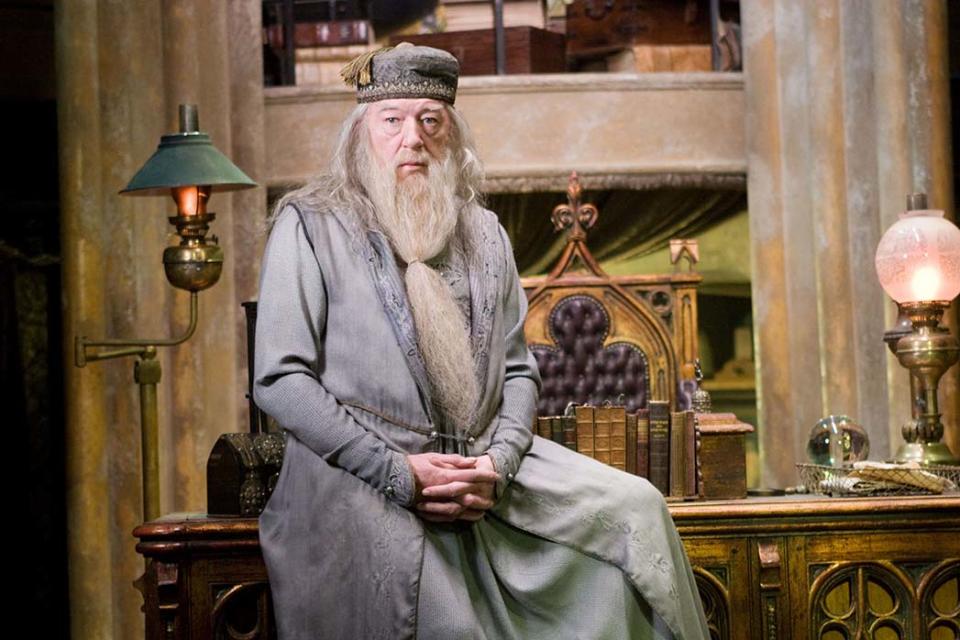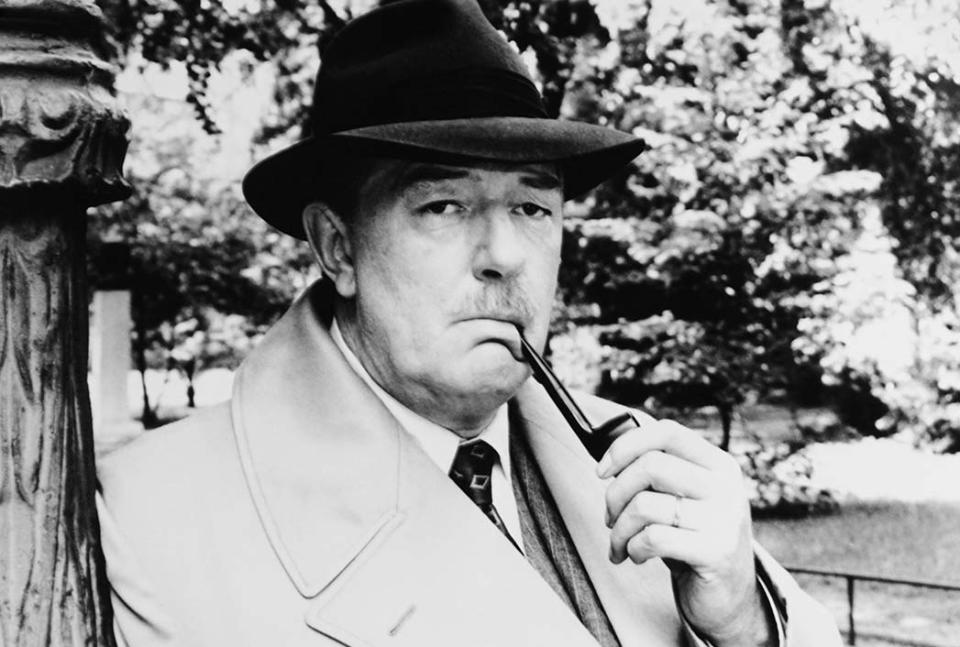Michael Gambon, British Stage Legend and Dumbledore in the ‘Harry Potter’ Movies, Dies at 82
- Oops!Something went wrong.Please try again later.
- Oops!Something went wrong.Please try again later.
- Oops!Something went wrong.Please try again later.
- Oops!Something went wrong.Please try again later.
- Oops!Something went wrong.Please try again later.

Michael Gambon, a protégé of Laurence Olivier and giant of the British stage who portrayed Hogwarts headmaster Albus Dumbledore, apparently with little effort, in the final six Harry Potter movies, has died. He was 82.
“The Great Gambon,” as Ralph Richardson once called him, died “peacefully in hospital with his wife Anne and son Fergus at his bedside, following a bout of pneumonia,” according to a family statement provided Thursday by a publicist.
More from The Hollywood Reporter
BBC Revises Social Media Guidelines: Hosts Can "Not Endorse Nor Attack Political Parties"
Top Consulting Firm Says Studios "Should Spurn" AI As Replacement for Creatives
Among the first group of actors recruited by Olivier for the National Theatre Company in the early 1960s, Gambon, a Dublin native, was nominated 13 times for an Olivier Award, winning in 1986 and ’90 for Alan Ayckbourn’s A Chorus of Disapproval and Man of the Moment, respectively, and in 1988 for Arthur Miller’s A View From the Bridge.
He received another one for his turn as a recently widowed businessman trying to reunite with his former mistress in Skylight, then added a Tony Award nomination in his lone Broadway appearance after the David Hare drama came to New York for a three-month visit in 1997.
Because of memory loss, Gambon retired from the stage in 2015 but continued to work onscreen in the culmination of a brilliant career that spanned seven decades. He was knighted by Queen Elizabeth for his services to drama in 1998.
Twelve years earlier, Gambon became a household name in the U.K. and made a splash in the States when he starred as Philip Marlow, a bedridden mystery writer who relives various crime stories through his hallucinations, in the six-part BBC series The Singing Detective, written by Dennis Potter. He would collect the first of his four BAFTA TV Awards for this performance, and the show would receive a Peabody Award after it aired on PBS.
Gambon also was memorable in another British mystery series, playing Parisian chief inspector Jules Maigret for two seasons (1992-93) on ITV’s Maigret, based on the Georges Simenon novels, and he landed an Emmy nom for his turn as U.S. president Lyndon Johnson on the 2002 HBO telefilm Path to War, directed by John Frankenheimer.
In the early 1970s, he rejected an invitation from producer Albert Broccoli to audition for James Bond.
The fun-loving, mischievous Gambon stepped into arguably his most famous role in 2004 when he took over as Dumbledore following the death of Richard Harris from Hodgkin’s disease two years earlier. (Coincidentally, Harris had played Inspector Maigret several years before Gambon did.)
His first outing as the gentle, avuncular wizard came in the franchise’s third film, Harry Potter and the Prisoner of Azkaban, with director Alfonso Cuarón having personally selected him to replace Harris. The family of the late actor reportedly wanted Peter O’Toole to get the job, one that Ian McKellen had turned down.
At the time, Cuarón said that Gambon was accepting the part with deep respect for its former master and “even kept a little Irish twist to his accent in a nod to Richard Harris.” Gambon would portray Dumbledore in five more Potter films, concluding with Harry Potter and the Deathly Hallows Part II (2011).
However, he was dismissive about how much work he needed to put in to play the bearded wizard. “There’s no character really, it’s just me! Me dressed up in a costume!” he told The Irish Times in 2010. “I’m essentially playing myself, that’s all I’m doing.”

Born on Oct. 19, 1940, in Dublin, Michael John Gambon moved to London at age 6 with his family when his father, Edward, an engineering operative during World War II, decided to join the workforce that was helping to rebuild the devastated British capital.
After dropping out of school, Gambon gained an apprenticeship as a toolmaker with manufacturing giant Vickers Armstrong, became a qualified engineering technician and appeared set to follow his father’s footsteps. But having had a taste of the stage at his local theater, he decided to send an audacious fiction-filled letter and résumé to Irish impresario Micheál Mac Liammóir, a move that would dramatically change his life.
In his letter, Gambon described his rich and wholly imaginary acting career, adding that he was just passing through Dublin on the way to New York.
“I said, ‘I’ve just played the lead in the West End in George Bernard Shaw’s Candida,'” he revealed in 2010. “Terrible lie. The actor playing it, I can’t remember who it was, his name was in lights. The thing is, they never even questioned it.”
Dutifully impressed, Mac Liammóir in 1962 gave Gambon his first professional acting job, the minor part of “Second Gentleman” with one line, in Othello at the Gate Theater. The production would then tour Europe.
A year later, Gambon, while auditioning with the opening soliloquy from Richard III, caught the eye of Olivier, who was on the lookout for promising young talent to join his new National Theatre Company. Billed as Mike Gambon, he — along with Robert Stephens, Derek Jacobi, Frank Finlay and others — would become one of the company’s “to be renowned”; his first performance for Olivier was in Hamlet at the Old Vic alongside O’Toole.
Olivier also was responsible for Gambon making it to the big screen, hiring him for three minor roles in Othello (1965), based on the National version. The film’s leads — Maggie Smith, Joyce Redman, Finlay and Olivier — each received an Oscar nom, a rare feat.
Gambon would spend three years at the Old Vic before he left the National — on the advice of Olivier — to expand his credentials at the Birmingham Repertory Company, where he took his first title roles, among them Othello and Macbeth.
It was around this time, thanks to his performance as a Scottish clan leader on BBC2’s 1968-1970 swashbuckling Elizabethan-era drama series The Borderers, that Gambon had a noteworthy near-miss.
With George Lazenby’s performance as Bond in On Her Majesty’s Secret Service (1969) failing to live up to expectations, Broccoli met with Gambon in London to discuss the role with him. The actor said he wasn’t handsome enough to play the super spy — he was “too fat” and “my teeth are like horses’,” he said — and Sean Connery would return for the next Bond film, Diamonds Are Forever (1971).
The 1970s and ’80s would see Gambon’s stage profile rise dramatically as he returned to London to play the melancholy veteran in Ayckbourn’s The Norman Conquests and star alongside Penelope Wilton in Harold Pinter’s Betrayal, back with the National (now having established itself on the South Bank).
The National’s 1980 staging of Brecht’s The Life of Galileo would see Gambon paid the rare compliment of having his fellow cast members applaud him in the dressing room on the first night. The Sunday Times would describe his work as “a decisive step in the direction of great tragedy … great acting.” It wasn’t long before he was dubbed “The Great Gambon” by Richardson.
“He well might have meant it in the circus sense, you know, like a clown or something,” Gambon said in a 1996 Playbill interview. “Back home in England, I don’t hear it much because we’re such a cynical bunch of bastards.”
With his craggy looks (“It’s like a fucking old wet bag,” he once said of his face), Gambon became a well-established character actor on television, with highlights including a well-regarded turn as Oscar Wilde on a 1985 BBC miniseries.

In between The Singing Detective and Maigret, Gambon played a violent and destructive gangster opposite Helen Mirren in Peter Greenaway’s controversial The Cook, the Thief, His Wife & Her Lover (1989).
After appearing on the big screen in Toys (1992), Mary Reilly (1996), as Fyodor Dostoyevsky in The Gambler (1997) and alongside Meryl Streep in Dancing at Lughnasa (1998), Gambon had a big year in 1999, appearing in Plunkett & Macleane, Tim Burton’s Sleepy Hollow and the BBC’s four-part adaptation of Elizabeth Gaskell’s 19th-century novel Wives and Daughters, which got him another BAFTA trophy.
Carrying on into the new millennium, Gambon was among the ensemble cast for Robert Altman’s critically lauded upper-class murder mystery Gosford Park (2001), portraying a wealthy industrialist among a who’s who of British acting greats (including another “to be renowned,” Jacobi). An Emmy and Golden Globe nom would follow a year later for his stint as LBJ in Path to War, an examination of the Vietnam War through the eyes of the 36th president.
He then won two more BAFTA TV awards, for playing an 18th-century clockmaker on Longitude in 2001 and a family member who has fallen on tough times in Perfect Strangers a year later.
As he was wrapping up his spell at Hogwarts, Gambon starred in Jane Austen’s Emma miniseries for the BBC and played King George V in Tom Hooper’s Oscar-conquering The King’s Speech (2010). He then joined British screen royalty Smith, Tom Courtney, Billy Connelly and Pauline Collins in Dustin Hoffman’s directorial debut, Quartet (2012), as a cantankerous former music director living in a nursing home.
It was in early 2015 that Gambon, then 74, announced that he would be giving up the stage. “It’s a horrible thing to admit, but I can’t do it. It breaks my heart,” he told the Sunday Times, adding that he’d tried to audition for a West End play with someone feeding him lines via an earpiece. “And after about an hour, I thought, ‘This can’t work.’ You can’t be in theater, free on stage shouting and screaming and running around, with someone reading you your lines.”
But he would continue — though not quite at the same pace as before — with his TV and film work, narrating the Coen Brothers comedy Hail, Caesar! (2016), voicing Uncle Pastuzo in the Paddington films released in 2014 and ’17 and appearing as British theater impresario Bernard Delfont in Judy (2019).
Gambon married mathematician Anne Miller in 1962 but moved out in 2002 after his relationship with Philippa Hart, 25 years his junior, was revealed. He had three sons, one (Fergus) with Miller and two (Thomas and William) with Hart.
Best of The Hollywood Reporter
Kim Cattrall and Five Actors Who Made Surprising Returns to a Role
10 Times Hollywood Predicted the Scary (or Not So Scary) Future of AI
21 Actors Who Committed to Method Acting at Some Point in Their Career
